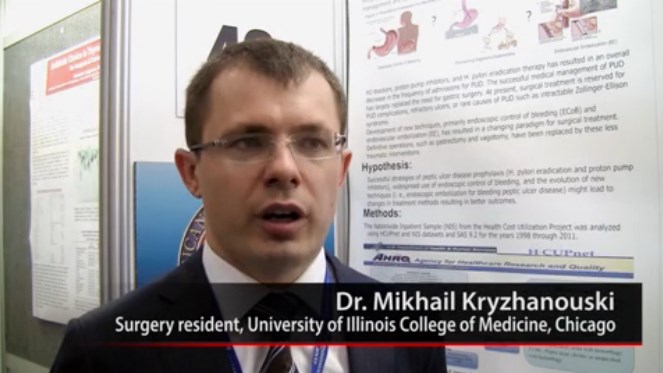User login
SAN FRANCISCO – If current trends continue, vagotomy and gastrectomy for bleeding peptic ulcers will be mostly a thing of the past, according to Dr. Mikhail Kryzhanouski, a surgery resident at the University of Illinois, Chicago.
Their use is quickly fading, eclipsed by better techniques and a steady drop in adverse outcomes, even though patients are presenting with more comorbidities, Dr. Kryzhanouski found in a review of patients in the U.S. Nationwide Inpatient Sample who were hospitalized for peptic ulcers from 1998 to 2011 (J. Am. Coll. Surg. 2014;219:e142).
Dr. Kryzhanouski shared the results of his study – and the reasons for his prediction – at the American College of Surgeons Clinical Congress.
The video associated with this article is no longer available on this site. Please view all of our videos on the MDedge YouTube channel
SAN FRANCISCO – If current trends continue, vagotomy and gastrectomy for bleeding peptic ulcers will be mostly a thing of the past, according to Dr. Mikhail Kryzhanouski, a surgery resident at the University of Illinois, Chicago.
Their use is quickly fading, eclipsed by better techniques and a steady drop in adverse outcomes, even though patients are presenting with more comorbidities, Dr. Kryzhanouski found in a review of patients in the U.S. Nationwide Inpatient Sample who were hospitalized for peptic ulcers from 1998 to 2011 (J. Am. Coll. Surg. 2014;219:e142).
Dr. Kryzhanouski shared the results of his study – and the reasons for his prediction – at the American College of Surgeons Clinical Congress.
The video associated with this article is no longer available on this site. Please view all of our videos on the MDedge YouTube channel
SAN FRANCISCO – If current trends continue, vagotomy and gastrectomy for bleeding peptic ulcers will be mostly a thing of the past, according to Dr. Mikhail Kryzhanouski, a surgery resident at the University of Illinois, Chicago.
Their use is quickly fading, eclipsed by better techniques and a steady drop in adverse outcomes, even though patients are presenting with more comorbidities, Dr. Kryzhanouski found in a review of patients in the U.S. Nationwide Inpatient Sample who were hospitalized for peptic ulcers from 1998 to 2011 (J. Am. Coll. Surg. 2014;219:e142).
Dr. Kryzhanouski shared the results of his study – and the reasons for his prediction – at the American College of Surgeons Clinical Congress.
The video associated with this article is no longer available on this site. Please view all of our videos on the MDedge YouTube channel
AT THE AMERICAN COLLEGE OF SURGEONS CLINICAL CONGRESS
